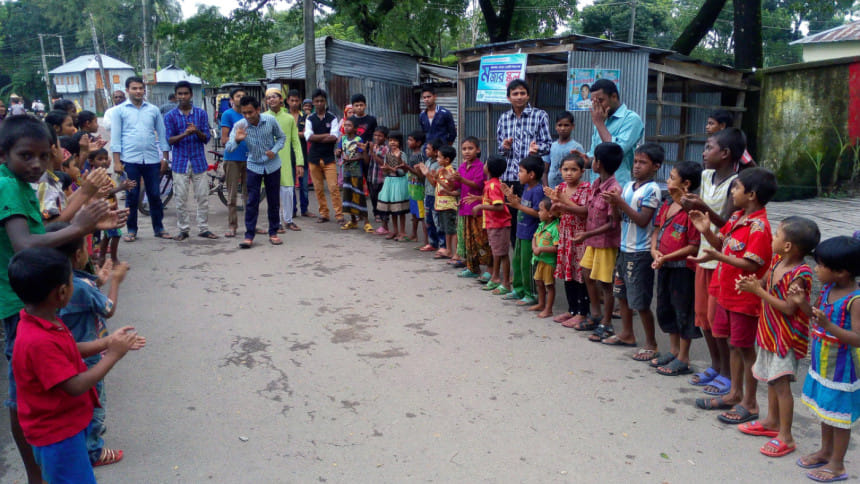Patuakhali Mojar School

Although seven-year-old Sumon lives in a Patuakhali town shanty, to some extent he's lucky. The child has both parents: while his father, rickshaw driver Afjal Hossain, struggles to provide for the five-member family on his meagre income, Sumon's mother Nazma Begum contributes by working as a domestic help.
His parents' efforts, however, used to leave Sumon without anybody to care for him for long hours and with no productive activity to occupy him, Sumon would roam the streets. From lacking any opportunity for a formal education, Sumon's future didn't exactly look bright, despite his parent's efforts.
But fortunately for Sumon and others like him, in June 2014 seven Patuakhali college students decided to establish a school for any child in the town not yet pursuing formal education.
The Mojar School, originally situated in a leased shop on College Road in front of the Patuakhali Government College, opened its doors to 10 students, with enrolment rising in just over one year to the current 62.
"Our dream is to see a Bangladesh free of illiteracy," says Saiful Islam, one of the school's co-founders. Together with his friends he visited local slum areas to drum up enrolment. "Many of our students never attended any school," he says.
The school runs a schedule of two daily shifts, from 7 to 8 am and 4 to 6 pm, explains Safiqul Islam, another of the institution's co-founders. Such class timings allow the college students to actively participate in tuition and other programmes.
"We also teach swimming, games and good behaviour, in the hope our students can become valuable citizens one day," says another co-founder Rezaul Karim Reza.
"To encourage regular attendance," admits fellow co-founder Imran Hossain Pial, "sometimes we treat the students with biscuits or chocolates. It makes school seem like great fun." While such gifts of sweets are often donated by socially-minded denizens, the school's day to day costs are borne by the seven friends.
"We even save money from the change given to us by our guardians for our lunches," Safiqul says, "to run the school."
Ironically, the popularity of the school proved a significant obstacle, straining the limited accommodation. "Originally we stopped our activities," says Saiful, "but afterwards we understood it was better to conduct classes even on the road. It's not ideal but sometimes the students have to study while standing on the roadside, due to the lack of sufficient classroom space."
Yet despite such difficulties, the Mojar School is positively impacting its student's lives. "I didn't know how to read and write," Sumon, now a student at Mojar, confesses, "But now I do. I feel great for being able to write my name and read books."
As a consequence of the school's influence, Sumon now hopes to become educated in order to better his family's practical circumstances.
Other students have similar backgrounds: many laboured in simple activities such as paper recycling or as helpers in teashops and hotels. One girl, Lipi, excitedly tells this correspondent that she was learning many things at Mojar. "And we get free books, pens, pads and pencils for our study," she adds, joyfully.

 For all latest news, follow The Daily Star's Google News channel.
For all latest news, follow The Daily Star's Google News channel. 



Comments